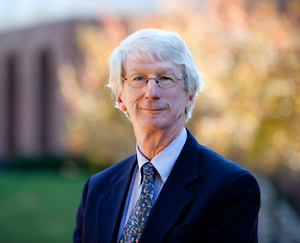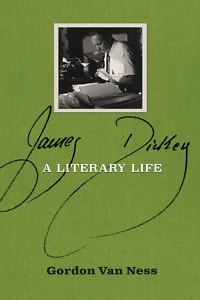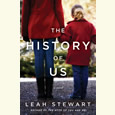The Man as a Writer
Gordon Van Ness discusses the complex legacy of poet James Dickey
James Dickey may be best known for his 1970 novel Deliverance and its 1972 film adaptation, for which he wrote the screenplay and in which he played the role of Sheriff. In the decades before the wildly successful film, he became one of America’s most celebrated — if often controversial — poets. During the decades that followed, Dickey’s literary star sank almost as fast as it had risen.
 In James Dickey: A Literary Life, Gordon Van Ness, author of five previous books on the complicated man from Atlanta, explores Dickey’s life and work. This comprehensive biography carefully ties each chapter — from childhood through his service in World War II, his student days at Vanderbilt, and beyond — to Dickey’s prodigious output and the development of his literary aesthetic. Van Ness recently answered questions via email about Dickey and his literary vision.
In James Dickey: A Literary Life, Gordon Van Ness, author of five previous books on the complicated man from Atlanta, explores Dickey’s life and work. This comprehensive biography carefully ties each chapter — from childhood through his service in World War II, his student days at Vanderbilt, and beyond — to Dickey’s prodigious output and the development of his literary aesthetic. Van Ness recently answered questions via email about Dickey and his literary vision.
A note on the exchange that follows: Normally, Chapter 16 Q&As are introduced in the third person. When it becomes necessary to share something about the circumstances of the interview, the name of the publication takes the place of “I” — e.g., Chapter 16 recently spoke with X by phone. But I can’t do that here. I first met Gordon Van Ness in a class taught by James Dickey in 1983. Both the biographer and his subject are intertwined with my life. Dickey wrote a recommendation for my first teaching job (which I still hold 31 years later) and a jacket blurb for my first book; Gordon has long been my sounding board for ideas about teaching, literature, and academic life. I may lack the journalistic impartiality most readers would prefer in an interviewer, but I knew that Gordon would have some interesting things to say about the man he has studied for most of his adult life.
Chapter 16: You emailed me recently, “I’m so very tired of Dickey’s work being judged and evaluated because of his behavior rather than the merits of that work.” Why do you suppose critics and previous biographers have been so eager to do the former rather than the latter?
Gordon Van Ness: In the late 50s and early 60s, Dickey courted modernists such as Ezra Pound and William Carlos Williams, corresponding with them and adopting the critical dicta that characterized their poetry, including poetic craftsmanship, learned allusions, and tightly constructed meter, in order to be successful. However, attempting to establish his own poetic identity, Dickey soon began to center the poet within the poem itself and thereby provide an autobiographical connection to the poet’s own life.
At the same time, during extensive poetry tours, what he labeled “barnstorming for poetry,” he embellished his war experiences and made up stories about his hunting and canoeing exploits. Readers willingly equated his poems with the poet himself. In a sense, Dickey’s popular and critical success validated his efforts to promote himself. The public myth diverted attention from the private man and his literary work. Critics didn’t do their homework.
Chapter 16: In this literary biography, how did you seek to balance those opposing weights, the scope of his work and the complexities of his life?
Van Ness: As Pat Conroy, who was himself an acclaimed novelist and a former student of Dickey’s, said, “A whole city of men lived in that vivid, restless country behind James Dickey’s transfixing eyes.” I was never James Boswell to Dickey’s Samuel Johnson, however. While I was interested in the writer as a man, I also wanted to present the man as a writer, and so I sought to examine how the events and experiences in Dickey’s life were reproduced in his work.
 Chapter 16: In the chapter titled “Vanderbilt,” you describe how the undergraduate experience focused Dickey’s work after World War II, with the school’s Fugitive Poets having set a course for Southern literature in the 1920s. Does the Vanderbilt influence resonate in Dickey’s later work and themes?
Chapter 16: In the chapter titled “Vanderbilt,” you describe how the undergraduate experience focused Dickey’s work after World War II, with the school’s Fugitive Poets having set a course for Southern literature in the 1920s. Does the Vanderbilt influence resonate in Dickey’s later work and themes?
Van Ness: I don’t think it resonates largely in what Dickey would have called his “late motion.” He was never a regional poet per se, such as Sidney Lanier or Allen Tate, though he was immensely interested in violence and primitive instincts as his friend Robert Penn Warren was, themes typically associated with Southern writers.
Chapter 16: During the decades of your research, what are some of the more surprising (publishable) facts you learned about your subject?
Van Ness: The most surprising fact that I learned about Dickey was something he himself admitted not long before he died. Despite the larger-than-life figure that he promoted, despite his bravado and Rabelaisian behavior, he was essentially a coward, which is why he created or exaggerated identities for himself. His own father perhaps sensed this and tried to “toughen” up his son by taking him to cockfights and bear-baiting contests. But Dickey himself was repelled by the blood and violence. His father never understood his son’s deep sensitivities or his need to re-create himself.
Chapter 16: As you observe, Dickey’s “introspection and his fantasies were ingrained from the beginning,” with much of his work focused on both real and imagined versions of self. Has your long and complete immersion in Dickey’s world affected your own version of self?
Van Ness: I think that when a man spends years studying the life of another person, especially a writer, he necessarily learns a great deal about himself. Better to maintain objectivity, distance, than to get too close. To show that, I imagine Dickey would have quoted Nietzsche, “He who fights with monsters should be careful lest he thereby become a monster.” The difference is that Dickey was never a monster, though he was many other things.
Chapter 16: Dickey is celebrated as poet, novelist, screenwriter, musician and even actor, yet, until this book, few have written on the scope and impact of his teaching. I believe that you and I have both carried lessons from Dickey through our own classrooms over the years. What are some you might care to share?
Van Ness: In Verse Composition, I remember his saying, “When we start this process, I want you to continue with it. Fight the thing through that we start with your own unconscious and your own dreams and see where it comes out. That’s the excitement and fun of it. Deep discovery. Deep adventure. … You live so much more intensely, and so much more vitally, and with so much more of a sense of meaning, of consequentiality, of things mattering, instead of nothing mattering.”
As usual, he was right.

Michael Ray Taylor is the author of Hidden Nature and other books. He lives in Arkadelphia, Arkansas.





